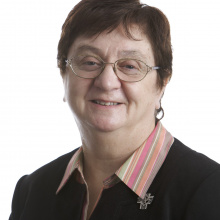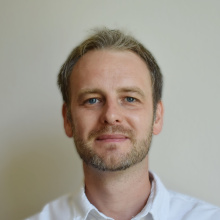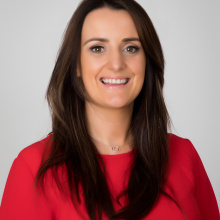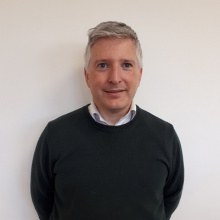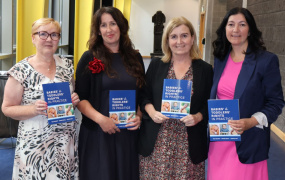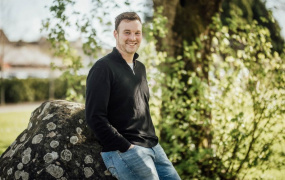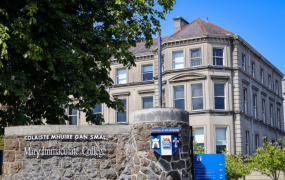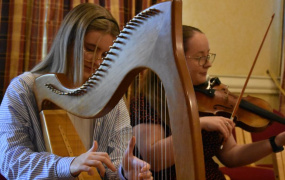Theology & Religious Studies
About
The Department of Theology and Religious Studies at Mary Immaculate College was founded in 1999. Along with a number of postgraduate programmes (taught and research), Theology and Religious Studies is offered on several of MIC’s undergraduate degree programmes (MI002, MI010 and MI011) in Limerick and Thurles. The department has seven full-time academic staff working on both MIC campuses as well as the main University of Limerick campus, all with international teaching and research expertise. They are supported by several part-time academic staff with specialisms in all the major areas of theological scholarship.
Apart from research undertaken on an individual basis by its staff members and research postgraduate students (MA/PhD), the TRS department has close links with research centres such as the Irish Institute for Pastoral Studies, which is based at MIC Thurles.
Theology is perhaps one of the most exciting subjects one can study. The study of theology and religion entails an intellectual exploration of the belief systems that have played a vital role in the shaping of our world throughout the centuries. Human beings are in search of meaning, and an engagement with theology allows students to examine critically some of the most profound answers given to the most fundamental questions about life.
Understood in the broadest sense, theology is an enquiry into the human conviction that life has ultimate meaning and worth. It is a rational and critical exploration of the human experiences of faith, hope, and love. One cannot be neutral about ultimate questions, and so theological enquiry usually takes place from the perspective of a particular believing community. Given that the majority of students at MIC are Christian in background, and given the College’s ethos, the focus of the theology programme is a critical and rigorously academic study of Christianity. However, the department recognises the increasing need for detailed theological study of other religious belief systems and endeavours to provide for this.
There is hardly any significant aspect of life or society that has not been affected by religion, for better or worse, and this alone already justifies a study of religion. If you are interested in history, sociology, or politics, you will come to understand the impact that religion has had in the past, and continues to have in the present. Similarly, if you are interested in architecture, music, literature, or the world of painting you will find that some of humanity’s most magnificent achievements are immediately linked to religion.
There are so many different exciting aspects to theology and the study of religion that it is difficult to think of another subject that covers such a diverse range of topics and ideas.
Subject Overview
Undergraduate
The Department of Theology and Religious Studies offers a wide-ranging perspective on the phenomenon of religion, and Christianity in particular. It does so by drawing on a great number of sub-disciplines, such as philosophy of religion, historical theology, Christian ethics, pastoral theology, sacramental theology, ecclesiology and so on.
The programme is designed to ensure that all the requirements of the Teaching Council for the teaching of religion are met. Those taking primary teaching degrees can specialise in Theology and Religious Education.
No previous study of theology and religion, nor any particular denominational affiliation, is required to take TRS as an academic subject.
See below for a list of modules in the Bachelor of Arts programme in descending order from First Year onwards:
This module is to introduce students to the phenomenon of religion, and to the belief systems and foundational texts of the major world religions, and to engage students in a critical dialogue with the major world religions from within the perspective of the Christian tradition. The phenomenon of religion seen as a possible answer and challenge to the human search for meaning. The nature of religion, and the critiques levelled at it by authors such as Feuerbach, Marx, Nietzsche, and Freud. Introduction to some of the major world religions, such as Hinduism, Buddhism, Chinese traditions, Judaism, Islam, and Christianity. The world-views and ideas of each religion, and their foundational texts. Specific practices, and political and sociological implications of different religions. Inter-faith dialogue between Christianity and the major world religions.
To provide students with an overview of Christian theology and some of its major themes. To engage students in a critical reflection on the nature of the theological disciplines. Introduction to Christian theology: its nature and history, and its various disciplines. The meaning of Divine Revelation. Faith and belief. The Scriptural basis of theology, including the origin and authority of the Bible. The Christian understanding of God as Trinity.
To introduce students to the foundations of Christian ethics, and to engage students in a critical reflection on the nature of moral theology. The nature of morality. The relationship between religion and ethics. The history and development of moral theology as a discipline. The sources and methods of moral theology, and its contemporary context. The role of the Bible in Christian ethics. The debate about whether or not there is a specific Christian morality. Human freedom, knowledge, moral responsibility, and the relationship between them. The concept of conscience. The natural law in tradition and today. The notion of sin in Scripture, tradition, and modern theological reflection.
To introduce students to theological reflection on Jesus of Nazareth.The distinctive character of the teaching of Jesus in its cultural and historical context. The various starting points for Christological study. The miracles and the parables and their role in Jesus’ proclamation of the Reign of God. The significance of the ministry, death and resurrection of Christ. The humanity and divinity of Christ: the development of Christological doctrine and the debate from the Council of Nicea to the present. Different approaches to Christology today. Christ in inter-religious dialogue: the challenge of other religions and ideologies.
To enable students to gain an in-depth knowledge of one or two contemporary important theological problems. The focus varies from year to year. In recent times the lecturer has chosen to focus on christian faith in contemporary culture. The first part of the module clarifies students' understanding of christian faith, especially, what is meant by faith in general, the act and content of christian faith, the universal character of faith and its relationship to beliefs, and the situation of faith today. The second part of the module reflects on contemporary culture and the challenges and opportunities which consumerism, technology, secularisation and secularism present to christian faith. The third part of the module consists of some guest inputs on themes such as ecology, prayer in contemporary culture, God and violence, and martyrdom in contemporary religion.
To enable students to gain an appreciation of the New Testament in its historical and social context.To introduce students to the main themes of the Second Testament books and to develop methodological skills.The historical, geographical, and social background of the New Testament books. The origins, formation and transmission of the Second Testament. New Testament writings as rooted in the Old Testament and the Jewish tradition. The canon of the New Testament. The form and content of the First Testament books: the Synoptic Gospels, the Acts of the Apostles, the Johannine Literature, and the Pauline Letters. Biblical methodology, and exegesis of key New Testament texts for their theological significance.
To examine the major themes involving the God-question from a Christian perspective thereby providing students with a solid grounding in some of the key issues in systematic theology. The Christian understanding of God. The origins, development, and the relevance of the doctrine of the Trinity. The problem of evil and theodicy. The atheist critique of faith and belief. The Christian understanding of eschatology. Writings of key thinkers from the patristic, medieval and modern eras as illustrating the manifold nature of the Christian understanding of God throughout the tradition.
Note: The following example is Church and State, morality and civil law. Other topics are possible, such as Bioethics, Just War Theory, Justice and Human Rights, Sexual Ethics and Virtue.
The New Testament and how the early Christians understood their relationship to civil society and the political authorities. The relationship between Christianity and the world, and the “autonomy” of secular matters. The nature and function of teaching authority in the Church, and its practical exercise in political and social matters. Conscience, religious freedom, the common good, and Church-State relations. Morality and civil law: Aquinas, the Hart Devlin debate, and recent theological reflection. The Christian as a public official and as a voter.
To enable students to gain an appreciation of the role of ritual and worship in Christianity.To provide students with a basic theological and historical knowledge of the Christian sacraments.The concepts of ritual and symbol. Liturgy and worship. The concept of sacramentality. Christ as the primordial sacrament of God, and the Church as a basic sacrament. Outline of the historical development and theology of the sacraments, with special emphasis on Baptism and Eucharist. Ecumenical and contemporary pastoral considerations concerning liturgy and the sacraments. Particular issues (e.g. the liturgical year, the Rite of Christian Initiation of Adults, etc).
To introduce students to the ecclesial dimension of Christianity. The Biblical roots of ecclesial consciousness and the origins of the Christian Church. Survey of the main events in the history and life of the Church: pre-Constantinian Christianity; from Constantine to the East-West schism; the Reformation and the Council of Trent; Vatican I to Vatican II; the ecumenical movement; current and possible future developments. The nature of the Church and its marks. Models as a means of understanding ecclesiology. Salvation outside the Church. Ministries. Issues concerning ecclesial authority and structures. Special questions in ecclesiology.
Staff from TRS teach on the post-primary concurrent teacher education degrees (MI010: Business Studies and Religious Studies and MI011: Gaeilge and Religious Studies) on MIC, St Patrick’s Campus, Thurles. These programmes are accredited by the Teaching Council and graduates are qualified to teach Religious Studies to honours Leaving Certificate level after the completion of their four year degree programme.
See below for a list of TRS modules on the BA in Education (Post-Primary) programmes:
The purpose of this module is to introduce students to major world religions and to equip students with the requisite knowledge to teach world religions in a post-primary school. The module introduces students to the phenomenon of religion and to the central belief systems, sacred practices and foundational texts of major world religions. It engages students in a critical dialogue with major world religions (such as Judaism, Islam, Hinduism, and Buddhism) from within the perspective of the Christian tradition. The module investigates the phenomenon of religion as a possible answer and challenge to the human search for meaning and also explores some of the critiques levelled at it. It explores the importance of inter-religious dialogue between Christianity and major world religions. A knowledge of major world religions is a core component of the discipline of Theology & Religious Studies and enables students to fulfil relevant requirements (such as The Teaching Council Curricular Specifications for Religious Education) for teaching RE at post-primary level.
The purpose of this module is to introduce students to the academic discipline of theology by acquainting them with theological reasoning as applied to a select number of key theological questions. In particular, students are exposed to philosophical and scriptural reasoning in the context of questions regarding God’s existence, science, and human identity. The course includes dialectical engagement with secular (non-theological) sources and positions, and incorporates philosophy of religion throughout.
The purpose of this module is to introduce students to the Old Testament and to equip students with the requisite knowledge to teach the Old Testament in a post-primary school. The module introduces students to the canon of the Old Testament and its main theological themes (e.g., God, covenant, faith, exodus, law, kingship, temple, exile, and prophecy). It will explore key texts and characters of the Old Testament (such as the stories of Abraham, Moses, and David) and situate them in their literary, historical, and cultural contexts. In so doing, it will introduce critical methods, skills, and tools required to read biblical narratives in a competent way. The module will also investigate the importance of the covenants of the Old Testament and the books of prophecy for the New Testament. A key question underlying the module is how the Old Testament is the foundation for the New Testament. The module will also explore how the Old Testament has been received in culture throughout history (e.g., in art, literature, music, film, tv). A knowledge of the Old Testament is a core component of the discipline of Theology & Religious Studies and enables students to fulfil relevant requirements (such as The Teaching Council Curricular Specifications for Religious Education) for teaching RE at post-primary level.
The purpose of this module is to introduce students to the New Testament and to equip students with the requisite knowledge to teach the New Testament in a post-primary school. The module introduces students to the canon of the New Testament (especially the Gospels and the Epistles of Paul) and its main theological themes. It will explore key texts and characters of the New Testament and situate them in their literary, historical, and cultural contexts. In so doing, it will introduce critical methods, skills, and tools required to read biblical narratives in a competent way. The module will also investigate how the New Testament relates to the Old Testament, particularly regarding the expectation of a Jewish Messiah and the significance of Jewish law. A key question underlying the module is how Christianity emerges from Judaism. The module will also explore how the New Testament has been received in culture throughout history (e.g., in art, literature, music, film, tv). A knowledge of the New Testament is a core component of the discipline of Theology & Religious Studies and enables students to fulfil relevant requirements (such as The Teaching Council Curricular Specifications for Religious Education) for teaching RE at post-primary level.
The purpose of this module will be to deepen participants’ knowledge and understanding of the person and work of Jesus Christ and introduce them to the main questions relating to the development of Christology. A knowledge of the New Testament and its Christology is foundational for students’ engagement with other theological topics. RE teachers need to know the fundamental elements of what the New Testament says about Jesus Christ and have the skills to apply this to their teaching. This module aims to develop participants’ critical knowledge and understanding of the person and ministry of Jesus Christ. It will also introduce them to the main questions for investigating the significance of Jesus Christ for today.
The purpose of this module is to introduce students to the academic discipline of Christian ethics/moral theology by (a) acquainting them with core moral-theological categories, and (b) developing their capacity for theological reasoning as regards a selection of moral issues. The course includes dialectical engagement with secular (non-theological) sources and positions, and incorporates moral philosophy throughout.
The purpose of this module is to introduce students to the question of God and to equip students with the requisite knowledge to teach about God in a post-primary school. The module introduces students to the question of God and, in particular, it will engage students in how Christianity approaches the question of God. By drawing upon the Bible and key thinkers it will outline the origins, development, relevance and critiques of the doctrine of the Trinity. The module will also investigate important philosophical questions relating to both the existence and nature of God (e.g., Problem of Evil, Morality and God, Arguments for the existence of God such as the Cosmological Argument, Argument from Design, and Ontological Arguments). It will also explore how the question of God is approached and experienced in culture (e.g., in art, literature, music, film, tv). The aim is to enable students to gain an appreciation of how the question of God is approached and critiqued in contemporary society. A knowledge of God is a core component of the discipline of Theology & Religious Studies and enables students to fulfil relevant requirements (such as The Teaching Council Curricular Specifications for Religious Education) for teaching RE at post-primary level.
The purpose of this module is to equip students with both a basic knowledge and philosophical understanding of the nature and purpose of religious education, the distinction between denominational and secular approaches to religious education, and contemporary issues concerning the intersection of ethos and religious education.
The purpose of this module is to provide an introduction to the origins, nature, and tasks of the Catholic Christian Church (founded on Peter and in which all Christian Churches participate to varying degrees) and to give insight into important theological and historical aspects of the Church, including its contributions, controversies, and challenges.
The purpose of this module is to introduce students to the significance of symbol and ritual in religious traditions, having human life in general and in religious traditions in particular. It will engage students in an analysis of how symbols facilitate human communication, shape identity, and foster a sense of belonging. The module will focus on patterns of ritual and symbolism in religious traditions, having regard to the sacramental praxis common to many Christian traditions, particularly as expressed in the Roman Catholic tradition. Students will explore the meaning contained in religious rituals of initiation and reconciliation – rites commonly celebrated in primary and secondary schools. The aim of the module is to equip students with the knowledge and skills necessary to meet curricular requirements for teaching Religious Education at post-primary level and to respond to the evolving cultural and educational context in which Religious Education is carried out today.
The purpose of this module is to develop students’ understanding of Christian ethics/moral theology through study of both key concepts/ideas and various ethical issues. Moral theological reasoning, inclusive of philosophical reasoning, is demonstrated and encouraged throughout the module through dialectical engagement with both Christian and secular (non-theological) sources and positions.
Postgraduate
The Department of Theology and Religious Studies offers the following postgraduate programmes:
- MA & PhD by Research and Thesis
- MA in Christian Leadership in Education
- Certificate in Christian Leadership in Education
In addition to various college awards and financial supports, postgraduate students may also be eligible for funding from the Bonaventure Trust, a private charity, which was founded a decade ago to support Catholic theology at Mary Immaculate College. Contact the Head of Department for further information.
For general research funding within the College, see the Research section.
MA & PhD by Research and Thesis
Staff of the Department of Theology & Religious Studies offer research supervision for both MA and PhD degrees by research and thesis.
Prospective students are invited to review the research interests and expertise of department members on the department homepage and contact the relevant staff member directly or else contact the Head of Department.
MA in Christian Leadership in Education
The MA in Christian Leadership in Education is an innovative postgraduate programme leading to a professional qualification. The programme will build much needed leadership capacity at both primary and secondary levels within the faith-based school sector.
The various modules in the programme will explore the following areas in depth:
- Educational Leadership
- Policy and Management
- Scripture and Theology
- Psychology and Leadership
- Group Dynamics
- Spirituality for schools
- Learning and Curriculum
- Liturgy and Sacraments within the school
- Emotional and Relational Competence
- Education and the Law
- School Governance and Management
- Issues of Social Justice in Education
- Reflective Practice
- Leading a Faith-based School in the 21st century
More detail on MA in Christian Leadership in Education here.
Certificate in Christian Leadership in Education
This certificate is designed to augment other qualifications participants may have achieved in areas of leadership and management so that they have the knowledge, competence and skills needed to lead a faith-based school.
The topics covered are the following:
- Jesus the Teacher
- Nurturing Personal Faith and Spirituality
- The Catholic School and Contemporary Culture
- Leading and Managing a Catholic School in Ireland Today
More detail on Certificate in Christian Leadership in Education here.
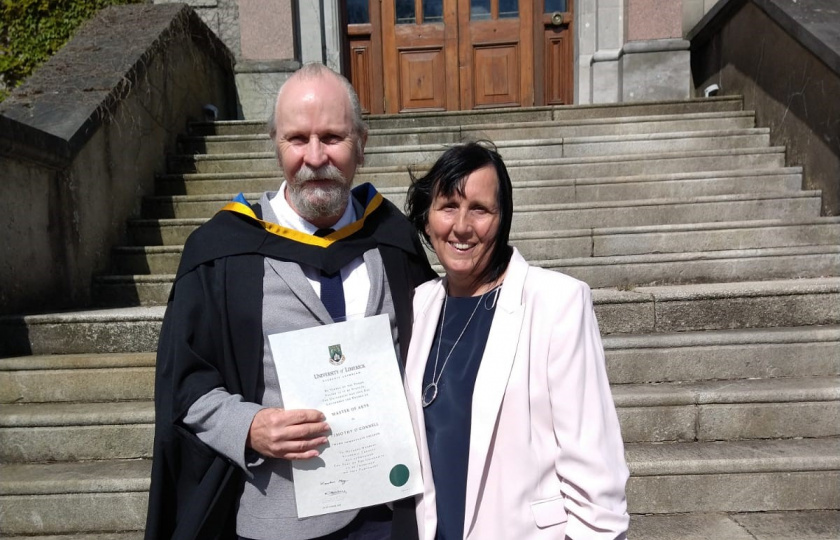
Timothy O'Connell, Research MA in TRS Graduate
Timothy O'Connell, photographed here with his wife Claire, completed a Research Master's in Theology & Religious Studies at Mary Immaculate College in 2020. Tim, whose dissertation focused on John's Gospel, is our first student to graduate with a Master's that was supervised by a Thurles staff member, Dr Jonathan Burroughs. Tim also recently had work published in both Reality and Scripture in Church.
Staff
TRS Department Administration
Administration for the Department of Theology & Religious Studies is handled by Deirdre Franklin in the MIC Arts Office.
T: +353 61 204507
E: Deirdre.Franklin@mic.ul.ie
Useful Information
Our commitment to advancing Catholic Education
Links
Professional Associations
Staff of the TRS department are active members of the following professional associations:
- Catholic Biblical Association (CBA)
- European Society for Catholic Theology (ESCT)
- Irish Biblical Association (IBA)
- Society of Biblical Literature (SBL)
Academic Institutions/Bodies
The TRS department has links with the following academic institutions/bodies:
- All Hallows Trust
- Carlow College
- Edgehill Theological College, Belfast
- Milltown Institute of Theology & Philosophy
- Roche Center for Catholic Education, Boston College
- School of Religion, Trinity College Dublin
- Stranmillis University College, Belfast
- St. Mary's University College, Belfast
- St Patrick's College, Maynooth
- The Priory Institute, Tallaght
- University of Notre Dame, Fremantle Australia
Other
The following are some useful resources:
Testimonials
What Students and Graduates say about Theology and Religious Studies at MIC...
"I graduated with a PhD in Theology and Religious Studies from Mary Immaculate College. In my four years as a postgraduate student, I experienced a supportive and collegial environment where curiosity and openness to learning was fostered and encouraged. During my time studying theology as a mature learner, I found a home for my curious mind but within a space that was student-centred and student-focused. The theology department staff were always available, motivating and modelled a style of teaching that was inclusive, facilitative, and collaborative. The learning and knowledge gained during my postgraduate studies has significantly informed my work and ministry as a healthcare chaplain and Clinical Pastoral Education Supervisor/Educator. Undertaking a PhD in Theology and Religious Studies at Mary Immaculate College has also resulted in the amazing opportunity to publish my research as a monograph with Peter Lang Publishers." Margaret Naughton, PhD Graduate
"I completed my undergraduate studies at Mary Immaculate College (MIC) Thurles, graduating with a BA in Education, Business and Religion Studies. Upon completing my undergraduate degree, I was awarded a scholarship to pursue a master’s degree within the Theology and Religious Studies Department. My commitment to education and personal growth was recognized when I was appointed as the Departmental Assistant for the Theology and Religious Studies Department. In this role, I have had the privilege of working closely with departmental members and students. This experience has helped to hone my organisational and leadership skills, which is all due to the department's dedication to academic excellence and holistic development. Since the beginning of my master’s degree, I have been provided with a number of incredible opportunities, such as studying in Rome for a semester. Studying in Rome was a transformative experience that deepened my understanding of theology and enriched my perspective on global religious practices. The exposure to diverse cultural and academic environments in Rome enhanced my teaching capabilities and broadened my worldview. With a solid academic background, practical teaching experience, and international exposure, I am well-prepared to inspire and educate students in religion. My journey from MIC to Rome has been marked by dedication, hard work, and a passion for learning, all of which I hope to bring to my role as a post-primary teacher upon the completion of my master’s degree." Michelle Murphy, MA Research Student & BA in Education (Post-Primary) Graduate
"Choosing to study Theology at MIC Thurles has been an immensely rewarding decision for me. It is a vibrant department, with lecturers that are deeply committed to student development. They are always approachable for discussions beyond the classroom, and much of their work is frequently published in academic and religious journals. The curriculum, ranging from the Theology of the Old Testament to contemporary moral issues, provides a highly stimulating learning environment. Thanks to my undergraduate studies in Religious Studies at MIC Thurles, I am now fully qualified and thoroughly prepared to teach Religion at the post-primary level." Noel Foxe, BA in Education (Post-Primary) Student
“Studying Theology and Religious Studies has numerous advantages. The warm close knit community results in many social benefits, as after only a couple of weeks lecturers know students by first name as well as students knowing other students by first name. This creates a very good atmosphere and a very helpful learning environment.” Daniel Kelly, BA in Education (Post-Primary) Graduate
“I was quite apprehensive about studying Religious Studies in MIC Thurles, but it has really exceeded my expectations. We get to study many interesting topics, from World Religions to Christology. It is both a challenging and rewarding process, and I look forward to teaching it in post-primary schools.” Kate Tormey, BA in Education (Post-Primary) Graduate
"Studying theology at Mary Immaculate College has altered my perspective on the world around us. Through the curriculum, I have been introduced to the many diverse world religions. This has aided my personal growth, allowing me to understand and appreciate various cultures, traditions, and beliefs. The course has also helped me to respect and understand people from all backgrounds, allowing me to navigate the diverse human experience." Ciara Moynihan, BA in Liberal Arts Student
“Studying Theology and Religious Studies at MIC enables you to reflect on Christianity and your faith. I found the TRS Department a very welcoming place to dip back into my faith.” Brian Sheehy, BA in Liberal Arts Graduate
“I really enjoyed studying Theology at MIC. As well as exploring material in the different modules that are important for the various exams, this subject equips you with practical skills that you can apply to your own life. If you are interested in this subject, or even have a tiny spark of interest, then I would definitely recommend studying Theology at MIC.” Clodagh Cummins, BA in Liberal Arts Graduate
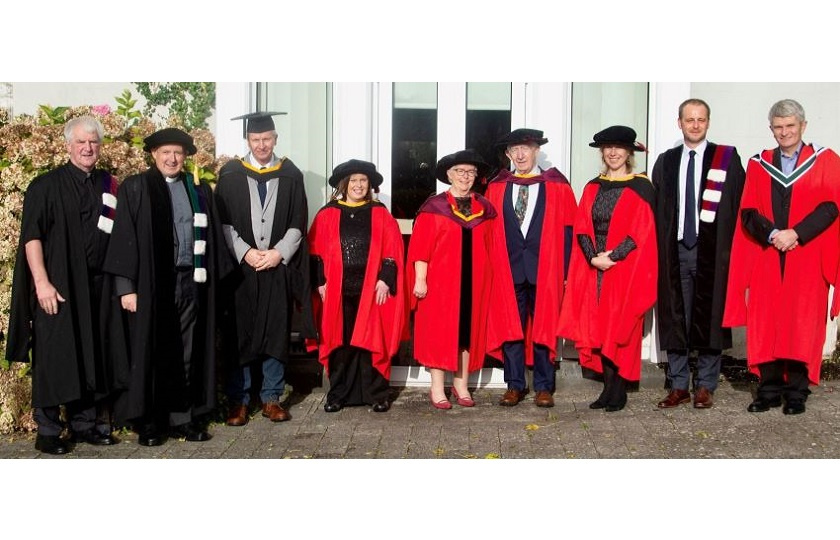
- About
- Subject Overview
- Staff
- Useful Information
- Testimonials



